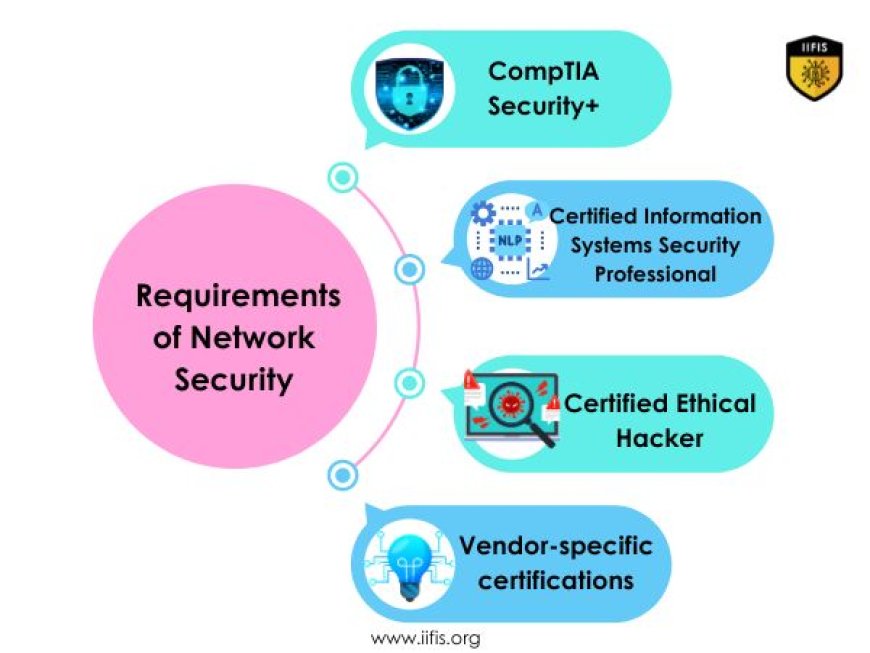Exploring Network Security Certification Pathways
Explore the best network security certification pathways for advancing your career in cybersecurity. Find accredited programs and training resources.

Several causes are driving an increase in the demand for network security specialists. There has never been a more important reason for protecting private information from cyber dangers as technology continues to link our society.
An important factor driving this demand is the rise in cyberattacks directed at people, companies, and governments. These attacks have an opportunity to damage national security, create large financial losses, and damage one's reputation. As a result, businesses are devoting larger amounts to securing their systems and networks toward such intrusions.
Hackers now have a larger attack surface to work with thanks to the fast speed at which technology is developing. Network Security has become much more advanced as a result of the growing popularity of mobile, cloud, and Internet of Things (IoT) technologies. To protect against constantly developing dangers, this complexity demands using qualified professionals who can establish and maintain strong safety precautions.
The different requirements related to network security certifications
CompTIA Security+:
-
Foundational certification was useful for employees just starting.
-
It requires a fundamental understanding of the ideas behind network security.
-
Applicants must pass just one exam.
Certified Information Systems Security Professional (CISSP):
-
Necessitates strong network security knowledge and understanding.
-
A minimum of five years of professional experience is required of candidates.
-
Pass a demanding test covering a range of cybersecurity topics.
Certified Ethical Hacker (CEH):
-
Focuses on understanding and locating computer system weaknesses.
-
After completing training and passing an exam, candidates can show that they have a hacker mentality.
-
Focuses on locating possible network security holes.
Vendor-specific certifications:
-
Developed to match particular technology and products.
-
Examples are the Certified Azure Security Engineer from Microsoft and the Certified Network Associate (CCNA) Security from Cisco.
-
Depending on the vendor's certification scheme and the particular certification being sought, different requirements apply.
Network security certifications are made for various job stages and skill levels. These certificates verify skill in repelling cyber attacks and range from basic choices like CompTIA Security+ to vendor-specific programs like Microsoft's Certified Azure Security Engineer and Cisco's CCNA Security. Specialized certifications like Certified Responsible Hacker are also available. For skilled people looking to advance their expertise in network security, they provide important certification.

What are the benefits of Network Security?
Network security is a must for protecting digital data and making sure its availability, integrity, and confidentiality. These are a few of network security's main benefits.
-
Protection Against Cyberthreats: Various online dangers, including malware, ransomware, scams, and attempts at hacking, can be defended against with the aid of network security measures like firewalls, intrusion detection systems, and antivirus software.
-
Stopping Data Hacking: Strong security measures help companies avoid unwanted access to confidential information, which lowers the possibility of data breaches that can result in financial losses, damage to their reputation, and legal effects.
-
Maintaining Business Continuity: By avoiding interruptions imposed by technological problems or cyberattacks, network safety protocols enable continuous access to important resources and services. This helps maintain productivity and business continuity.
-
maintaining the trust of customers: Strong network security protocols generate trust between clients by displaying a commitment to protecting their private and confidential data. Maintenance of reputation and client devotion depends on this trust.
-
Regulation Compliance: To protect private information, companies must adhere to several industry-specific rules and compliance requirements, which call for the implementation of particular network security measures. Following these rules helps you stay out of trouble with the law and prevent fines and penalties.
-
Protection of Intellectual Property: By avoiding loss or unwanted openness, network precautions protect dependent data and creativity, giving companies an advantage over competitors while promoting development.
-
Prevention of Disruption to Operations: Cyberattacks have a chance to disrupt company operations and result in losses of money. By minimizing the effects of assaults and maintaining the efficient operation of systems and networks, network security solutions assist in minimizing such disruptions.
-
Detection and Response to Security Incidents: Network security solutions come with tools for quickly identifying and handling security incidents, enabling businesses to stop attackers before they do a lot of damage.
Network security is crucial for protecting important resources, upholding stakeholder trust, maintaining regulatory compliance, and reducing cyberattack risks.
Uses of Network Security Certification
Certifications in network security provide numerous important advantages:
-
Validation of Skills: Confidence and employment are increased by certifications, which show proficiency in network security.
-
Career Advancement: Those with certifications in cybersecurity have greater possibilities for advancement in jobs and higher-paying positions.
-
Industry Recognition: Certifications from respectable organizations are generally acknowledged and appreciated within the cybersecurity field.
-
Compliance Requirements: By providing skilled personnel, certifications support businesses in conforming to industry rules and compliance standards.
-
Continual Learning: Professionals must continue their education to stay up to date on the newest developments in network security to maintain their certification.
-
Networking Opportunities: Professional communities, forums, and events are accessible to participants in certification programs, allowing for information sharing and networking.
Network security certifications are useful tools for workers who want to succeed in the cybersecurity industry and make a name for themselves.
Network security is necessary for protecting digital assets, maintaining stakeholder confidence, guaranteeing regulatory compliance, and reducing cyberattack risks. As technology develops and cyber threats get more complex, there is an increasing need for network security knowledge. At different phases of their employment, certification programs like CompTIA Security+, CISSP, CEH, and vendor-specific certifications allow professionals to verify their knowledge and proficiency in network security. Businesses can defend against cyberattacks, maintain business continuity, and preserve the availability, integrity, and confidentiality of data by investing in network security solutions. In today's interconnected world, network security is finally the key component of a holistic cybersecurity schedule.nn























